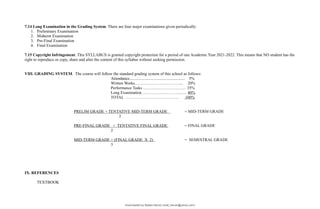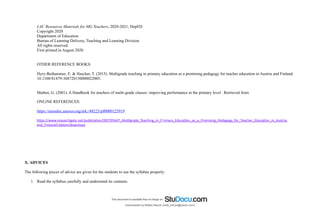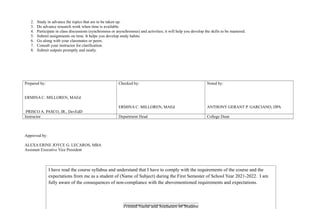The document is a syllabus for a course on teaching multi-grade classes from the Bato Institute of Science and Technology. It outlines the course objectives, which are to demonstrate an understanding of theories and concepts of multi-grade learning, display knowledge of pedagogical approaches for different grade levels, and employ effective teaching strategies in a multi-grade classroom. The syllabus provides a weekly schedule over 10 weeks, dividing the course content into 8 modules that will address topics like the structure of multi-grade programs, principles of multi-grade teaching, classroom diversity, and the roles and responsibilities of multi-grade teachers. Students will be assessed through quizzes, assignments, exams and other activities completed both individually and collaboratively online
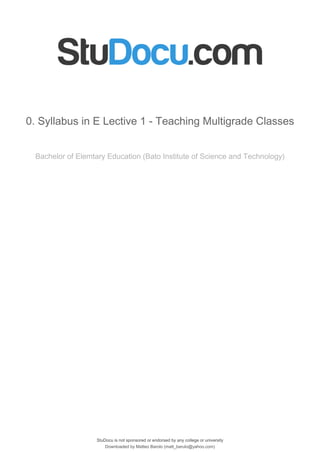
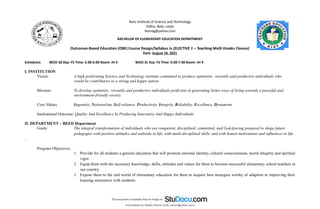
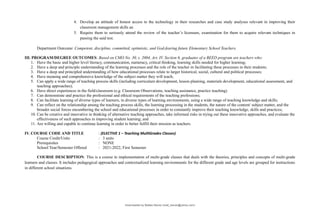
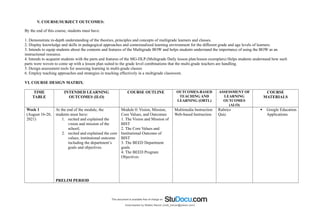
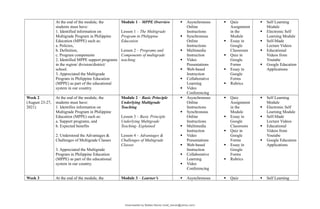
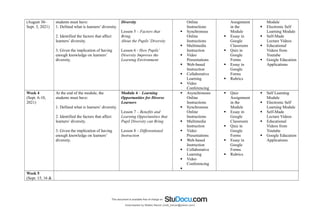
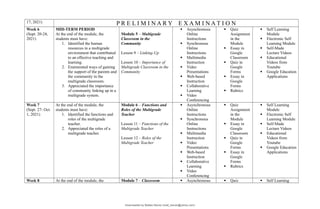
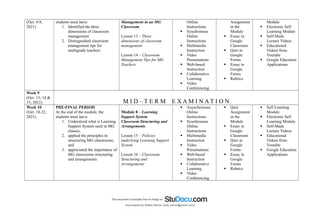
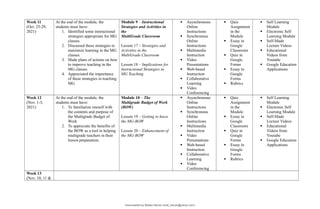
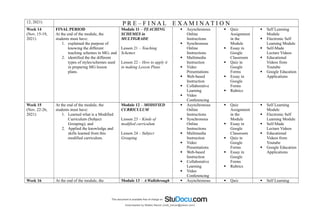
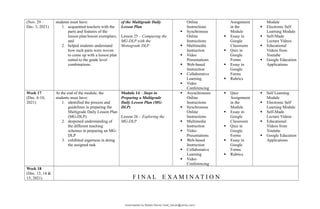
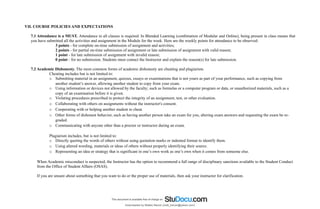
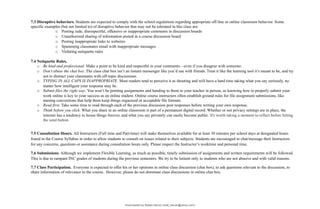
![7.8 Computer Applications. Students are expected to be proficient in using common applications software such as Google Classroom (for asynchronous
online learning), Google Drive, Google Forms, Google Meet (for synchronous online learning), Facebook Messenger, Microsoft Word, Excel, and PowerPoint,
WPS. This is essential as you will be making class presentations and submitting computerized assignments, quizzes, researches, and exams. Students are also
expected to be proficient in submitting (Turn-in or Hand-In) files such as document, Word, WPS, picture in Google Classroom.
7.9 Joining the Class in Google Classroom. To use Google Classroom, you sign in (your Google Account/gmail) on your computer or mobile device and join
classes. After you join a class, you can get work from your instructor and communicate with your classmates. You can join a class in 3 ways:
o A class link—Your instructor sends you the link.
o A class code—Your instructor sends or tells you the class code.
o An email invite—Your instructor sends you the invite.
After you join a class on one device, you're enrolled in that class for all devices.
7.10 School Portal. Students can access the official School Portal for purposes of looking student grades and subject instructors.
7.11 Policy on INC. The grade of “INC” is given if a student’s class standing throughout the semester is “Passing,” but fails to take the final examination or fails to
submit module assignment/activities and other requirements of the subject due to illness or other valid reasons. In case the class standing is not “Passing” and the
student fails to take the final examination for any reason, a grade of 5.00 shall be given.
Removal of the “INC” must be done within the prescribed time [within one (1) SEMESTER] by passing an examination or meeting all the requirements of the
course, after which the student shall be given a final grade based on his/her overall performance.
For purposes of scholastic standing, a grade of “INC” is not included in the computation. When it is replaced by a final grade, the latter is to be included in the
grades during the semester when the removal was made.
7.12 Written Works in the Grading System. “Application” of the 4A’s in the module is the focus in rating the WRITTEN WORKS of our grading system,
considering the following in giving the points:
1. Use of proper writing conventions such as spelling, grammar, syntax, capitalization and punctuation.
2. Mastery of written vocabulary
3. Clarity and fluency of the written works
4. Use clear and logical structure within the text.
7.13 Performance Tasks in the Grading System. “Evaluation/Pagtataya” in the module is the focus in rating the PERFORMANCE TASKS of our grading system,
where content criteria are used to evaluate the degree of a student’s knowledge and understanding of facts, concepts and principles.
Downloaded by Matteo Barolo (matt_barulo@yahoo.com)
lOMoARcPSD|8782142](https://image.slidesharecdn.com/0-syllabus-in-e-lective-1-teaching-multigrade-classes-220321165139/85/0-syllabus-in-e-lective-1-teaching-multigrade-classes-14-320.jpg)
